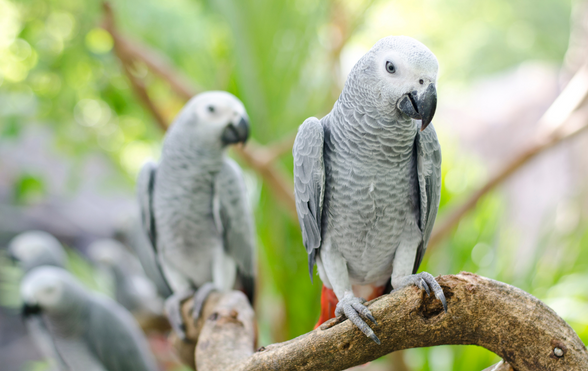Illness. How many times do you think to yourself, ah, it won’t happen to me? Or more accurately– it won’t happen to my bird? But it can, and does. Maybe not to your bird, but to many birds. And thankfully, the ones that we can talk about are insured with us.
Table of contents:
Hypocalcemia in birds | Liver disease in birds | What is Aspergillosis in birds? | What is acute Aspergillosis? | What is chronic Aspergillosis? | What is Airsacculitis in birds? | What is Psittacosis? | What is Teflon poisoning? |
…..but what are we talking about, we hear you say. Well that would be the most common illnesses that we see our ‘insured birds’ having to face. Thankfully not alone.
Here we reveal the three most common illnesses that we see in birds…..
Hypocalcemia in birds
This condition occurs when the bird is suffering from a calcium deficiency. This can occur due to a range of problems that can include excessive egg laying, lack of calcium in the diet, lack of exposure to UVB lighting, metabolic problems, gland problems or Vitamin A deficiency.
2. Liver disease in birds
This can have a range of causes, and the signs of the disease can be very similar to other conditions. Symptoms of liver disease can include: A distended abdomen, poor feather quality, diarrhoea or green or yellow colouration of the urates. However, these symptoms are in no way conclusive of liver disease, and could be a sign of anything. The only person who can diagnose the disease is your vet.
It’s so important to ensure you’re registered with a suitable vet. Bertie wasn’t registered when he choked on a nut, which resulted in a 30 mile trip to an Avian vet.
| Claim payment case study
We often see birds that suffer from ongoing conditions, or multiple conditions at same time. We were able to help a Bare Eyed Cockatoo who had Hypocalcemia, paying vet fees of around £109 in 2016. However sadly he’s still quite poorly. He’s also suffering with Liver Disease, more specifically Hepatic Lipadosis (fatty liver). We’ve helped his owner meet vet fee bills of around £2865 during 2016 for this separate disease |
We can cover parrots for up to £5,000 of vet fees
Alternatively you can call us on 0345 982 5505
3. Respiratory problems: Aspergillosis or Airsacculitis
What is Aspergillosis in birds
Aspergillosis, also known as Asper, is a respiratory disease that’s caused by the fungus Aspergillus. The fungus is common, and can thrive in warm, moist conditions. The fungus spores can become airborne and can be breathed in, usually with no consequence.
Aspergillosis can be acute or chronic.
What is acute Aspergillosis?
Acute aspergillosis can produce symptoms such as severe breathing difficulties, loss of appetite, frequent drinking and can cause a bluish tinge of the mucus membranes or skin (known as cyanosis). It generally affects the trachea, voice box and air sacs.
What is chronic Aspergillosis?
Chronic aspergillosis starts in the respiratory system, with the spores gradually spreading throughout the body.
Unfortunately the bird may not show any symptoms until the disease has progressed quite significantly. Depending on the location of infection, symptoms can range from breathing difficulties and breathlessness when exercising, to loss of voice, tremors, seizures, and if the liver is affected, green urates.
However, the infection can have a range of symptoms.
| Claim payment case study
We have helped a range of beautiful birds with Aspergillosis. This includes an African Grey whose been suffering for a while. His treatment is ongoing, with claims paid to date of around £1902 since 2015, when he was first diagnosed. |
The second common respiratory complaint is Airsacculitus.
What is Airsacculitis in birds?
Unlike humans, birds have air sacs where the air they’re breathing initially enters before moving to the lungs. Because of this, respiratory diseases will often initially develop there.
Airsacculitis may not show itself in the bird until its quite advanced. Symptoms can include abnormal and heavy breathing, and becoming out of breath with little exercise.
| Claim payment case study
Stanley the African grey has been suffering with Airsacculitis – claims paid have totaled around £2,500 over the last 2 years |
We can cover parrots for £2,500 or £5,000 of vet fees, mortality and theft
Alternatively you can call us on 0345 982 5505
And what about other conditions?….
Other conditions seen by ExoticDirect can include Psittacosis and Teflon poisoning.
What is Psittacosis?
| Claim payment case study
We’re currently helping a beautiful Blue Fronted Amazon whose suffering with Psittacosis (formerly known as Chlamydia) – claims paid to date are around £1,666. |


